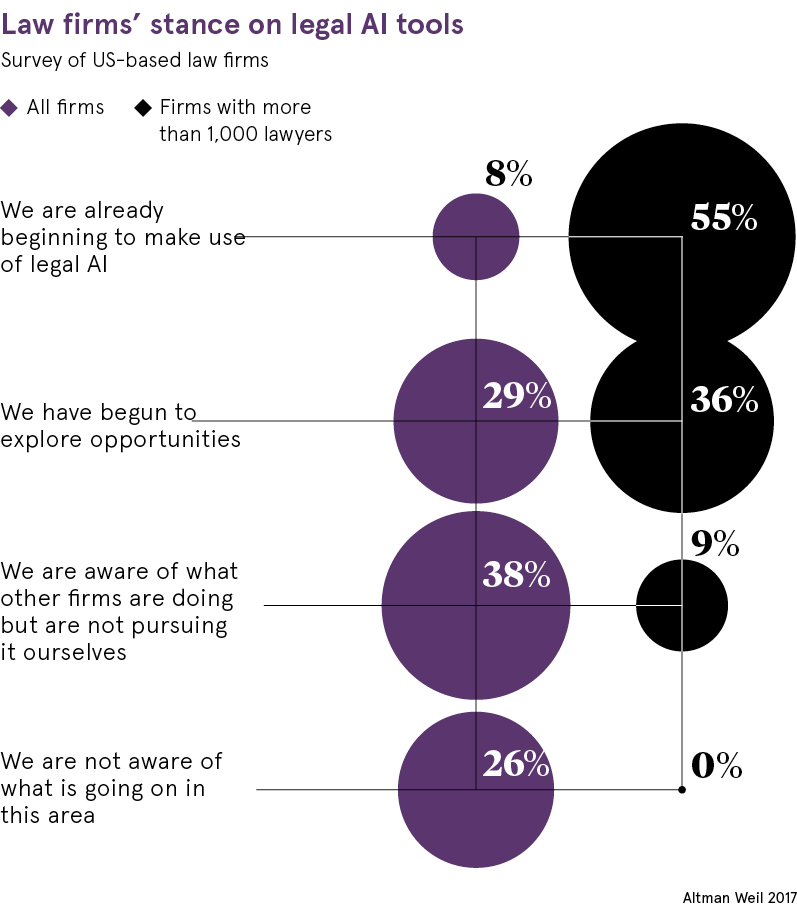From checking leases at the Land Registry to sorting through millions of documents for disclosure during litigation, artificial intelligence or AI is speeding up some of the most repetitive legal tasks.
Much of this work has historically been the bread and butter of lawyers who have charged by the hour for such services. But lawtech startups and legal services providers offering AI are poised to take over many of these tasks, depriving established law firms of a large slice of their revenues.
Critics wonder whether law firms are prepared for the coming changes. Given the transformation that automation requires, who in the sector is ready for the AI revolution?

“The middle market is the danger zone,” says Matt Meyer, chief executive of law firm Taylor Vinters and chairman of lawtech startup ThoughtRiver. Mid-sized law firms lack the resources of the biggest firms to invest heavily in AI technology while their management structures are too cumbersome to allow the creation of interesting collaborations, incubations and investments with startups.
“Those law firms have an acceptable level of profitability which means they don’t have to innovate; they aren’t really concerned about using tech to preserve profitability. They have long-term, sticky relationships with clients that produce repeat business,” adds Mr Meyer.
But Duncan Eadie, IT director at Foot Anstey, a regional law firm, says: “This is more about management, risk and matching cultures than it is about size. Many mid-tier firms have that in abundance.”
Forward-thinking firms, no matter what size, will already be considering this as an opportunity
Mr Eadie says clients are driving the shift to AI as they look for innovative firms that offer value for money, transparency and tech solutions. “We will certainly see more disruption in the sector as we go forward, but forward-thinking firms, no matter what size, will already be considering this as an opportunity,” he says.
Emily Foges, chief executive of Luminance, an AI platform for the legal industry, says that until recently some of the biggest law firms thought they didn’t need to worry about the cost-savings offered by AI because their huge clients weren’t price sensitive.
However, over recent months, even these firms have started to realise that clients are starting to demand lower costs. “Yes, the legal profession is ready for AI. Though whether everybody has realised that is another matter,” says Ms Foges.
“Firms who say ‘we charge by the billable hour so the more time we spend on an activity, the more value is associated with it’ are starting to realise that what their clients want from them is time spent thinking and analysing negotiation points, not trawling through repetitive documentations.”
Some believe that the partnership structure of law firms acts as a break on innovation. It slows down progress as all partners need to agree on new moves. Meanwhile, as they all take their share of the profits, this can leave law firms lacking the funds for investment.
Chris DeConti, executive vice president of global solutions at Axiom, an alternative legal services provider, warns: “Structural limitations like the partnership structure, limited investment capacity and over-reliance on lawyers rather than technologists, analysts or data scientists will impede the effective adoption of AI by law firms.”
But AI, indeed any innovation, should deliver more than simply cost-reductions. It also needs to add value to the legal process. Mr DeConti says AI can streamline legal work, which reduces cost. But the more interesting potential is for AI to be used to derive insights from contracts and other legal documents that can be applied to the business. “These insights can save money or generate revenues that dwarf the savings represented by reducing legal costs,” he says.
A substantial proportion of law firms’ work will be automated, taking away a proportion of revenues. An AI can churn through hundreds of leases during the acquisition of a shopping centre, for example, and quickly find any relevant clauses that matter to a client. It would take a team of lawyers days to sort through the leases manually and extract the important information or to analyse documents to see if they need to be disclosed during litigation.
If law firms are simply charging by the hour – some even charge by six-minute units – they stand to lose significant revenues from the AI revolution. Nick West, chief technology officer at Mishcon de Reya, says: “The value in litigation, what you pay for, is the litigation strategy, understanding how we are going to win this case that is a matter of really mastering the facts of the case and understanding what is going, and moving the chess pieces accordingly.”
The law firms that are ready for the shift will be the ones with a culture of innovation. That includes finding new ways to charge for the value their services add, given that the time-based charging model will be turned upside down by superfast AI technology.
